
Cian suddenly asked, “What’s wrong with my sandwiches?” in a tone that was part grumble and part whine.
They had sat and eaten without a word between them for so long that Eithne glanced aside to see whom he might have been speaking to.
“I… don’t think anything is…” she quavered, hoping to appease him. “I’m certain they’re very good.”
“Sweetdew says there is,” he said petulantly. “She says they’re built like a rotting pile with bits sticking out the edges.”
This was the first thing Sweetdew was supposed to have said since they had fled the night before. Eithne had begun to believe that Cian had been making up the cat’s jokes and commentary all along, and now that he had stopped pretending to care about her, he had stopped this too.
It warmed her heart to think that her furry little friend might not be imaginary after all, but a warm heart was what she most feared – she must not let it thaw out of its sheltering case of ice.

“Well,” she said timidly, “it’s true you’re sometimes being a little… generous with the meat and cheese…”
“But I’m hungry!”
“Why don’t you make yourself two sandwiches, then? It’s easier.”
“Because then you’ll be thinking me piggish,” he mumbled into his collar.
He looked so like her old Cian that out of habit a tiny giggle bubbled up in her. “Fie, lad! And what shall I be thinking if you’re making the one and piling it so high you can’t close your mouth around it?”
He looked up from his lap, and the brief glance he gave her was not wry but wounded – and not wounded and angry, but wounded and helpless.
Eithne quickly looked away. Her heart was melting; and yet if he was to look at her so, she would have to make herself colder then ever. She had not foreseen that she might come to believe his lies simply because she wanted to believe.
But Cian too could be cold.

He threw back his head and stiffly said, “Listen closely to me, Eithne. I shall take you around and show you your new home tomorrow when it is light. I hope it suits you, for you shall not leave this place again until my left cheek is as fair as the right.” He gave the black mark a loud smack.
Eithne wrapped her cold hand around her cold fist and squeezed until this new wave of despair had rolled well over her. This declaration seemed to prove that all along he had only wanted her because she could remove that mark – and now he would keep her captive until she did.
She did not even know whether he wanted his children; perhaps they were only another means for him to manipulate her emotions. Suddenly all the love she had been trying to dam up behind the ice broke through and flooded over her poor babies.
She pulled her hands back against her belly, frail and cold as they were, hoping they might give at least her babies the feeling of being warm and protected. She and they were trapped with their demon father – and Sweetdew and her babies with them.
And yet Cian had said he would not hurt Sweetdew’s kittens… her “little cute-and-so-forths”, he had called them…
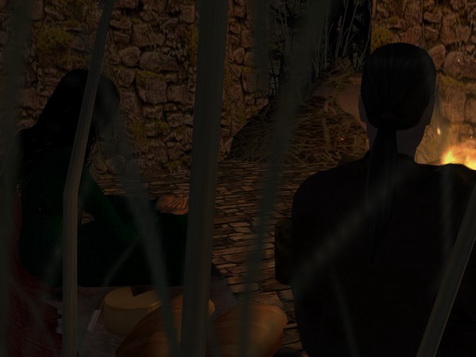
“This is not your prison,” Cian said hastily after a long silence, as if he had been hearing her thoughts or having dark thoughts of his own. “It is your fortress. You may go outside – I shall show you how far you may go – but no farther. Not a step farther!” he warned. “Not for anyone, Eithne. Not if your father himself comes and tries to call you outside… not even if Connie drags herself almost to the gate and pleads for you to go out to her… not even for me, Eithne. Are you hearing?”
“Aye…”
“Are you hearing?” His voice was growing almost frantically high-pitched, though she had not refused. “Not even if I tell you to go out! Not even if I try to force you! You must fight me if I do.” He pulled his knees up beneath his chin and held his head in his hands, hiding his black mark and all the rest of his face behind his long fingers. He whispered something – it sounded like “I shall try not to hurt you…”
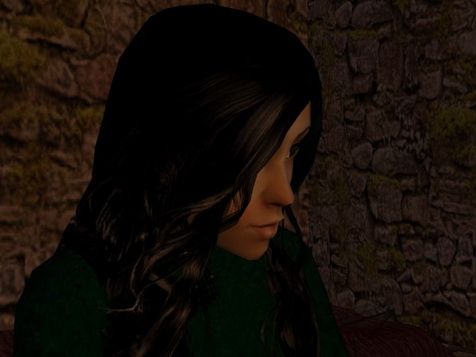
Eithne’s heart hardened up again in horror, but with a jagged, crystalline edge of anger.
“Can you not even be controlling your own evil, sir?” she hissed.
“My own!” he moaned. “My own! Not his!” He limply slapped at his cheek again.
During their long ride, Eithne had decided that the black mark was in fact crippling him, and that she must do all she could to delay or avoid removing it, lest she unleash some still more fearsome monster. But if he was telling the truth…
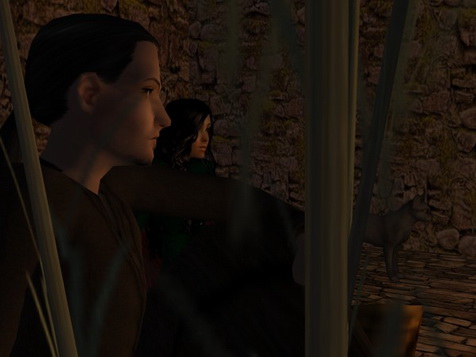
She picked up one half of the shell of the egg she had just eaten and began breaking away bits of the brittle edges. “Why should I believe you?” she asked softly. “You’ve been lying to me for so long.”
“When?” he cried. “How? Never! I have never lied to you!”
“You said you were an angel!”
“I am!”
“What sort of angel is all black and – and–
He choked, “Batty!” and tried to catch a sob in his sleeve.

“With horns?” she corrected defiantly. She would not let him joke with her now.
Cian squinted at the fire for a moment before he spoke. “An angel of the night,” he said hoarsely.
“Ach!” Eithne tossed her eggshell down again. “That’s nothing but a fancy way of saying ‘demon’, I’m thinking.”
“That’s the plain way of saying what I am. Or what I was.”
“And what are you now?”
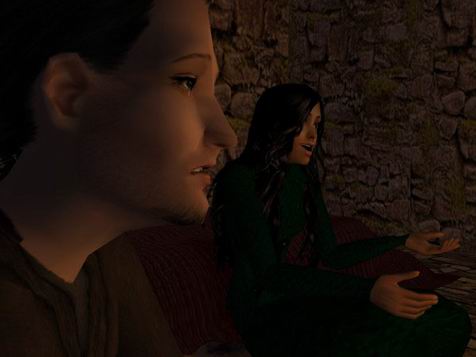
“A wandering star,” he murmured, “to whom is reserved the blackness of darkness forever.”
Eithne frowned. “That’s still sounding fancy to me.”
“It may be,” he said testily, “but it is in your Bible, dear girl. An angel wrote that, long ago.”
He paused for a moment, and in that time, in the place where voices stayed when they were silent, his own grew warm and softened.
“My brother the poet,” he said wistfully. “He whispered it to a man who wrote it down. ‘And those angels who kept not their first estate, but left their habitation, He has reserved in everlasting chains under darkness until Judgment Day.’”
He lifted his hand and looked at his wrist.
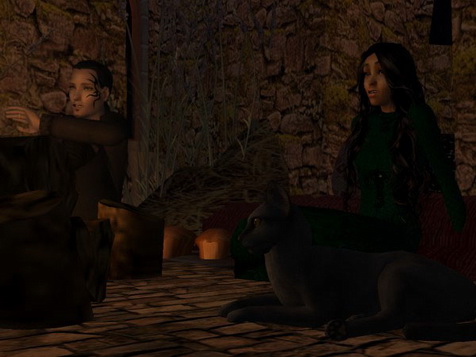
“The chains are a poetic touch, of course, but a prison it is.” He dropped his arm and softly added, “And the darkness is real.”
Then he sat silently, hunched over with his two fists sandwiched between his chin and his knee, and his face turned towards the fire. His mouth was squashed into a frown, but his eyes were very sad.
Slowly, so he would not turn a sad eye on her, Eithne reached down to retrieve her discarded eggshell. She needed to hold something hard and jagged again – she needed to be something hard and jagged if he was to look so.
Round and round she pinched off tiny bits of shell between finger and thumbnail. When the entire rim was neat and straight and so finely serrated it might have cut like a saw, she asked, “What did you do?”
He lifted his head and said, “I shall tell you, but I ask a favor of you first.”
“What is it?”

“Let me be coming to sit beside you, love,” he said mournfully, “as we used to sit when you would be telling me stories about when you were a girl.”
Eithne looked down past her eggshell and into the fire. Out of the corner of her eye she saw him lean a little closer, though he did not rise.
“I am not a poet like my brother,” he said, “so I cannot be talking prettily to you, and it’s a fool I shall sound if I’m trying. Nevertheless I shall try.”
He paused again, but Eithne forced herself to sit as still as a snowmaiden, frozen to the core.
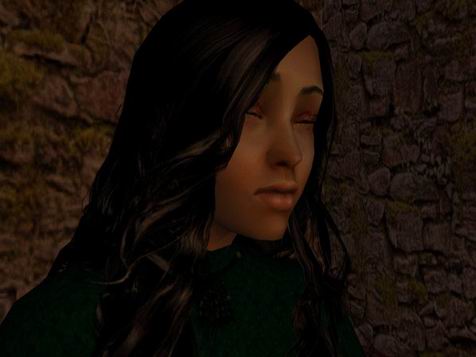
“When I am with you,” he said, “your world does not seem like such a prison to me, nor so dark. But if you’re sitting so far from me, and turning your face from me, and turning your love from me, it is like being cast out of Heaven a second time. Out of my little earthly paradise.”
Eithne did not need to look up to see the melting look in his eyes. She could fairly feel its heat falling on her.
She balanced the half-shell for a moment between her fingertips, and then she squeezed until it crackled and collapsed, and she tossed it into the fire. She thought it unwise to be hard and cold when one was as fragile as she.
“Come nigh to me, lad,” she murmured and patted the blanket beside her. “It’s warmer when we’re two.”











That's right, Cian. And Eithne. Just be nice to each other. And the banner looks very hopeful as well.